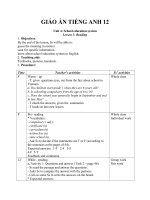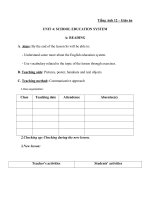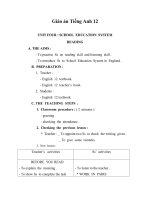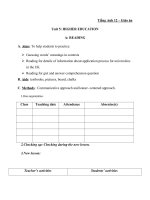Giáo án Tiếng Anh 12 unit 5: Higher education
Bạn đang xem bản rút gọn của tài liệu. Xem và tải ngay bản đầy đủ của tài liệu tại đây (184.73 KB, 29 trang )
Tiếng Anh 12 – Giáo án
Unit 5: HIGHER EDUCATION
A: READING
A. Aims: To help students to practice:
Guessing words’ meanings in contexts
Reading for details of information about application process for universities
in the UK
Reading for gist and answer comprehension question
B. Aids: textbooks, pictures, board, chalks
C. Methods : Communicative approach and leaner- centered approach.
1.Class organization:
Class
Teaching date
Attendence
Absentee(s)
2.Checking up: Checking during the new lesson.
3.New lesson:
Teacher’s activities
Students’ activities
I. Warm-up:
- Ask Ss some questions:
1. What are you going to do after you
finish high school?
- Work in pairs, discuss and answer the questions
- Stand up and tell the class the answers.
- Understand the aim of the lesson: Unit 5: higher
education
2. Which university would you like to
attend?
3. Where will you live if you study at a
university far from your house?
- Get feedback
- Lead Ss to the new lesson: higher
- Work in pairs, ask and answer the questions
education
1. Hue University
II. Before you read :
2. Hanoi University of Architecture
- Ask Ss to work in pairs, ask and 3. Hanoi University of Natural Science
answer the following questions:
4. I would like to apply for Hanoi University of
1. How do you say in English the names Natural Science.
of these universities?
2. What university would you like to
apply for and why?
- Get feedback.
- Give Ss suggested answers.
- Read the text in silence.
III. While you read :
- Ask students to look through the
passage and read in silence
- Help students read the passage
- Explain pronunciation and meaning of
new words which appear in the passage
Vocabulary
• applicant (n): người xin học
- Find out new words.
- Understand the aim of the text.
- Do the tasks that follow.
• application from (n): đơn xin học
• blame (v): đổ lỗi
• daunt (v): làm nản long
• mate (n): bạn bè
• scary (v): sợ hãi
• undergraduate course: khóa học
đại học
Task 1 :
- Introduce the task: Complete the
following sentences, using the right
forms of the words in the box.
- Ask Ss to complete the following
sentences, using the right forms of the
Task1:
words in the box.
- Go around class and help Ss if they
need.
- Study the task carefully.
- Choose the right word to fill in the blanks.
- Exchange their answers for peer correction.
- Tell the class the answers.
- Call on Ss to give their answers.
1. campus
- Correct mistakes.
2. blamed
3. scariest
4. challenges
Task 2:
5. amazing.
- Introduce the task: Find out who:
a. attended a party on the first weekend
at college.
- Look at the task, read the text again to give the
answers.
Sarah: 1- a. attended a party on the first weekend at
b. didn't get on very well with the college.
roommate.
2- e. was very excited about going to
c. was not used to meeting different college.
people every day at college.
d. liked having a chance to be creative.
Ellen:
3- b. didn't get on very well with the
roommate.
e. was very excited about going to
4. c. was not used to meeting different
college.
people every day at college.
f. enjoyed the first year at college.
Brenden:
- Go around class and help Ss if they
need.
5- d. liked having a chance to be
creative.
6- f. enjoyed the first year at college.
- Call on Ss to give their answers.
- Correct mistakes.
Task 3:
- Introduce the task: Answer the
following questions.
1. What did Sarah do on the first
weekend?
- Understand the task.
- Read the text again, answer the questions on the
text.
1. She went out with her new friends, walking
around the campus.
2. Because at the party everyone was busy
playing some games and no one seemed to
noticed her.
2. Why did Sarah feel so lonely at the
party?
3. What problems did Ellen have with
her roommate?
4. What did Brenden think about his
first year at college?
3. Her roommate left the window open when it
was cold outside. She went to bed early. She
blamed Ellen for making her sick.
4. Brenden thought the first year at college was
the best and most challenging of his life.
5. It provides him plenty of opportunities to
meet non-engineering students as well as
5. What does the social calendar of the
other engineers and many of them have
colleges provide him?
become his best friends.
- Guide Ss to answer.
- Go round the class to help Ss if
necessary.
- Call on some Ss to give their answers.
- Correct mistakes
IV. Home work: (2 minutes)
- Do Reading exercise of Unit 5 in workbook and
prepare Part B : Speaking at home
- Ask students to read the passage again.
- Ask students to do Reading exercise of
Unit 5 in workbook and prepare Part B :
Speaking at home
Unit 5: HIGHER EDUCATION
B: SPEAKING
A. Aims: To help students to practice:
Talking about application process to tertiary study in Vietnam
Asking and answering about time of application process to tertiary study in
Vietnam
B. Aids: Textbooks, pictures, board, chalks
C. Methods : Communicative approach and leaner- centered approach.
1.Class organization:
Class
Teaching date
Attendence
Absentee(s)
2.Checking up: Checking during the new lesson.
3.New lesson:
Teacher’s activities
I. Warm-up: what is my job?
students’ activities
- Show Ss some documents requiring for - One Ss go to the board, chooses a job that
tertiary institutions and ask them what he/she wants to do in the future and mime a
they are.
- Call on some Ss to answer.
typical activity which it involves.
- Answer the questions
1. an application form
2. an identity card
3. a reference letter
4. a birth certificate
-The S ask the other :
- What is my job?
- The others watch his/her activity and make
II. Pre-speaking
yes/no questions to guess the job
- Call on an S to go to the board and ask Possible questions:
him/her to choose a job that he/she wants to - Are you mending something?
do in the future and mime a typical activity
- Are you typing?
which it involes.
- Ask the whole class to look at their friend’s
- Do you work outside?
activity then ask him/her yes/no question to
- The S answer the questions using only yes or
guess his/her job
no. The game is over if an S guess the job.
- Observe students playing game and stop
when there is a winner
III. While speaking:
Task 1
- One S reads aloud the request of the task
- Call an Ss to read aloud the request of the
- Do task 1 individually. Put the ticks on those
task
which are obligatory for whom to be admitted
- Ask the whole class to do task 1
to a university in Vietnam
- Exchange their answers with their friends.
- Ask students to exchange their answers with
their friends.
- Call some students to read aloud their
- Some students to read aloud their answers to
the class; others listen and comment
Expected answers:
answers to the class
an application form
- Give corrections and remarks.
an identify card
a copy of the originals of school certificate
a birth certificate
a copy of records of your performance ay
school
scores of the required examination.
Possible problems:
- Students may don’t know the meanings of
some application process
- The teacher elicits the meaning of these
application process for students to guess
Task 2
- Ask students to work in pairs ,reading thee
information in their books, asking and
- Work in pairs
- Read information in their books and practise
asking and answering questions about the
application process to tertiary study in
Vietnam.
answering the question about the application
process to tertiary study in Vietnam
- Walk around to observe students talking
and help them if necessary.
- Ask T if necessary
- Call some pairs to stand up and ask &
answer. Ask other pairs to listen and
comment
- Some pairs to stand up and ask & answer;
- Make necessary correction and comments
other pairs to listen and comment
Expected pair work:
S1: When do you fill in and send the
application form?
S2: In March
S1: When do you take the GCSE examination?
Task 3:
- Introduce the task to the students ask them
to work in groups of four
S2: in May.
…
- Listen to the instruction and form groups of
- Ask students to make discussion and take
four
note
- Discuss and write the process of applying to
- Go around and help them if necessary
a tertiary institution in Vietnam
- Call some groups to handle their notes
- Ask T if necessary
among the groups and check.
- Call on some groups to stand up and make
discussion in front of the class. Ask other
groups listen and give comments
- Handle their notes among the groups and
check.
- Some groups in turn stand up and make their
discussion in front of the class; other groups
listen and give comments
- Give T’s own comments
Expected group work:
S1: I think the first process of applying to a
tertiary institution in Vietnam is to fill in and
send the application form.
S2: Yes, then we must take the GCSE
examination
- T goes around to remind students to use
S3: Only when we pass the GCSE
English and suggest some difficult structures
examination, can we take the entrance exam.
It often takes place in July.
….
Possible problems:
- Students may speak Vietnamese while
discussing.
IV. Post-speaking:
- Ask students to write a paragraph about the
process of applying to a tertiary institution in
Vietnam
- Work in groups. Discuss the process of
applying
to
a
tertiary
institution
in
Vietnam.
Answer: In order to be admitted to a
university in Vietnam, all students have to
following the process of applying. During
March, they have to fill in the application
form and send it to the university they choose
in March. After passing the GCSE
examination held in May, all students are able
to sit for the entrance examination in July.
Successful candidates will be sent a letter of
acceptance from the university. All students
have to do now is to prepare all required
papers to be officially accepted of that
university.
- Take note their home work
V. Homework:
- Ask students to write about the process of
- Do homework.
- Prepare part C listening
applying to a tertiary institution in Vietnam.
Unit 5: HIGHER EDUCATION
C: LISTENING
A. Aims: Students should know about the problems they may have when studying
in a new school
Develop the ability to get details from listening text to do true/false and
multiple choice exercises.
Get detailed information on some problems students may have when
studying in a foreign country.
B. Aids: Textbooks, pictures, board, chalks
C. Methods : Communicative approach and leaner- centered approach.
1.Class organization:
Class
Teaching date
Attendence
Absentee(s)
2.Checking up: Checking during the new lesson.
3.New lesson:
Teacher’s activities
I. Warm-up:
Students’ activities
-Give Ss a question to discuss: “Talk about the - Students form pairs and listen to T’s
problems you may have when studying in a instructions
new school.”
-Work in pairs, asking and answering the
Interview
problems facing students when studying in a
- Imagine that in each pair, one of you is a
foreign country
Vietnamese student studying in a foreign - Work in pairs; discuss the problems they
country; the other ask her/him problems facing may have when studying in a new school.
students when studying in a foreign country
Possible questions:
II. Pre-listening:
S1: What problem you have to face when
- Ask students to look at the part: Before studying in America?
listening
S2: There are many problems such as: food,
- Read loudly the words:
Proportion; majority;
accommodation, living cost…
tutorial; international;
available; appointment; Agricultural; rural;
thoroughly.
- Listen to T and guess the meanings of these
words
- Walk round, listen and help students
- Ask students to repeat loudly the words
- Listen and check pronunciation
- Practise reading the words in chorus and
individually.
- Read loudly the words:
III. While-listening:
- Understand those words.
Task 1
- Introduce
the
task:
Listen
to
the
conversation between John and David and
circle the best option (A, B, C or D) to
complete the following sentences.
- Ask students to read the questions quickly.
- Guide students the requests of the task.
- Read the questions quickly.
- Read the conversation twice
- Listen to the listening script.
- Call some students to give their answers.
- Listen again and tick true or false in their
- Read the conversation the third time for Ss to books
correct.
- Check their answers with their friends
Key: 1-C; 2-A; 3-C; 4-A; 5-B
- Answer the questions.
Task 2:
- Ask all students to spend 2 mins to read the
1-C; 2-A; 3-C; 4-A; 5-B
questions and options in the task
- Read the questions and options in the task
- Play the record once again and ask students to in 2 mins
do the task
- Listen to the record again and choose the
- Ask students to work in pairs to exchange best option
their answers
- Work in pairs and exchange their answers
- Ask some students to read aloud their
answers
- Some students read aloud their answers ;
others listen and give comments
- Listen and give remarks. T can play the
record again if students cannot give correct Expected answers:
answers
IV. After-listening:
- Ask Ss to work in pairs. Ask and answer the
question:
"Would you prefer to do an undergraduate
1
2
3
C
C
B
- Work in pairs. Ask and answer the
question:
"Would you prefer to do an undergraduate
course abroad or in your country?”
course abroad or in your country?” Explain - Stand up and speak out.
E.g.
your choice.
- Guide Ss to do.
S1: Would you like to do an undergraduate
- Call some Ss to practice asking and course in Vietnam or abroad?
answering the question.
E.g.
S2: I’d like to do an undergraduate course
in Vietnam
A. Would you like to do an undergraduate S1: Why so?
course abroad or in your country?
S2: Because my English is not good enough
B. I would like to do an undergraduate course and I cannot afford tuition fees and
in my country.
A. Why?
B. Because my English is not very good and I
cannot afford tuition fees and accommodation
for studying oversea.
accommodation for studying overseas.
V. Homework:
- Assign homework.
- Prepare the section C (The Writing part of
Unit 5).
- Prepare the section C (The Writing part of
Unit 5).
Unit 5: HIGHER EDUCATION
D: WRITING
A. Aims: To help students:
Practice writing short passage about the problems that Vietnamese students
may encounter when studying abroad.
Using main ideas from discussion to write a passage.
B. Aids: Textbooks, board, chalks
C. Methods : Communicative approach and leaner- centered approach.
1.Class organization:
Class
Teaching date
Attendence
Absentee(s)
2.Checking up: Checking during the new lesson.
3.New lesson:
Teacher’s activities
I. Warm-up:
Students’ activities
- Ask students some questions about how to - Listen to the T’s question
write a letter of request.
- Some students answer T’s question. Students
- Do you want to study abroad? Why or why can exchange their opinions with their friends
not?
Possible answers :
- Call some students to answer then give
remarks
-Yes, I want to study abroad because the
learning environment there is better than in
- Give feedback and lead Ss to new lesson.
Vietnam.
II. Pre-writing:
- No. I don’t want to study abroad because the
- Teacher introduces the task: You want to
apply for an undergraduate programme in a
cost of studying and living there is much higher
in Vietnam.
university in England. Write a letter of
request (about 150 words) to UCAS to ask
for the information about the admission
requirements
to
the
university,
using - Study the task carefully.
information in the Reading and Speaking - Work in pairs to give outlines
section on page 52 & 56. You may follow
the outline below:
- One S read aloud the request of task 1
- Guide Ss to write outlines.
- Form groups of four and discuss and take
a) Introduction:
notes the problems they may face when
- State the reasons why you are writing, your studying abroad.
interest in tertiary study in England (mention
the
name
universities/ ... )
of
the
programme/the
b) Request:
- State what information you would like
them to provide: tuition fee, accommodation,
exams,
d) Further information:
- Say you would be happy to supply further
information about yourself such as your
English proficiency and record of secondary
education study, ...
- Some groups make discussion in front of the
class; others listen and give comments
Possible discussion:
S1: I think English language is the first
problem we will face while studying abroad.
We learn English in our country but we don’t
have chance to speak English with native
c) Conclusion:
people.
- End with a polite closing.
S2: The second problem is learning styles at
- Walk round the class to give Ss assistance.
III. While-writing:
tertiary level. We are not familiar with
independent
learning
and
modern
study
facilities.
- Ask Ss to write
- Call on some Ss to read out their writing in - Use main ideas in the outline to write a letter
front of the class.
of request (about 150 words) to UCAS to ask
- Ask Ss to exchange their writings for peer for the information about the admission
requirements to the university
correction
- Correct mistakes.
- Exchange their writings for peer correction
Suggested answer.
475/57 Le thanh Ton St. District 1
- Correct mistakes.
Ho Chi Minh City
- One S read aloud the request of task 2
March 15th, 2008
- Do task 2: write a passage about the problems
that Vietnamese students may encounter when
Dear sir/madam,
studying abroad basing on the idea in task 1
I’ve read a lot about tertiary study in the UK
and very impressed by the reputation of
many famous universities there. Now I am in
the last year of the high school and will
finish secondary education in 3 months. I am
very much interested in an undergraduate
course
in
economics
in
- 1 or 2 students write his/her passage directly
on the board
Bermingham
University. Could you please send me some - Ask if necessary.
information
about
the
admission
- Pay attention to such linking words as first,
requirements, tuitions fees, accommodation
second, etc.
and details of the course? I am ready to
supply any information about myself if - Look at the board and correct their friend’s
necessary.
writings
I look forward to hearing from you soon.
Yours faithfully,
Hoang Thanh Nam.
- Give corrections or comments to the writings
on the board
IV. Post- writing:
- Ask Ss to read the letter again.
- Give remarks on the writing
- Read the letter again
V. Homework:
- Correct mistakes
- Rewrite the letter at home.
- Prepare the section D (The
focus part of Unit 4).
Language
- Rewrite the letter at home.
- Prepare the section D.
Unit 5: HIGHER EDUCATION
E: LANGUAGE FOCUS
A. Aims:
Pronunciation: Students practise pronouncing stress of more than threesyllable words.
Grammar: Students study the structure as well as the usage of conditional
sentences.
Vocabulary: Students learn to use words relating to the topic application
process to tertiary study and some abbreviations of some main high school
exams
B. Aids: Textbooks, board, chalks
C. Methods : Communicative approach and leaner- centered approach.
1.Class organization:
Class
Teaching date
Attendence
Absentee(s)
2.Checking up: Checking during the new lesson.
3.New lesson:
Teacher’s activities
I. Warm-up:
Students’ activities
- Write some more than three-syllable - Listen to teacher
words
on
the
board,
and
then
pronounce those words aloud.
- Read aloud
- Pay attention to its stress.
- Pay attention to its stress.
- Ask Ss to read after
- Understand the aim of the new lesson.
o Economics
- Listen and repeat from 2-3 times
o Psychology
o Philosophy
- Some of them stand and read words aloud
o Engineering
- Practise in groups
o Sociology
- Some groups compare with their results and read
o Mathematics
the words in sentences aloud
o Geographical
o Archeology
- How do we pronounce these words?
- Read again these words and lead to the
lesson
- The answers can be various
- Today, we learn how to pronounce more
than three-syllable words.
II. Pronunciation
a. Give Ss some rules of word stress in more
than three-syllable words.
- Help students how to
pronounce those
words correctly by reading first as model.
- Listen and give more questions in pairs









